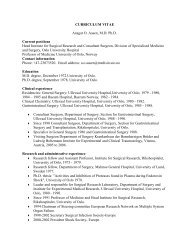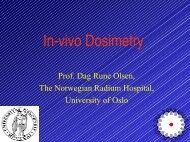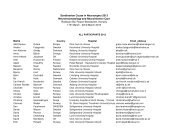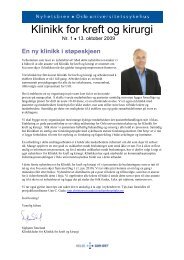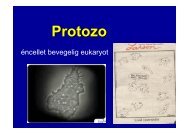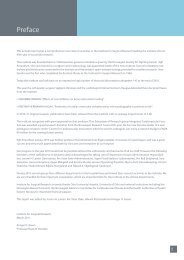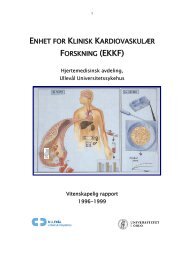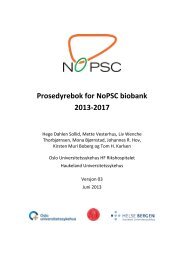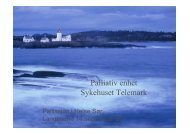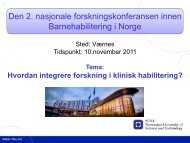Novel genetic and epigenetic alterations in ... - Ous-research.no
Novel genetic and epigenetic alterations in ... - Ous-research.no
Novel genetic and epigenetic alterations in ... - Ous-research.no
Create successful ePaper yourself
Turn your PDF publications into a flip-book with our unique Google optimized e-Paper software.
DiscussionEven though the subgroup of MSI-tumors as a whole is associated with a relatively goodprog<strong>no</strong>sis, there is still a subgroup with<strong>in</strong> the subgroup with a worse survival. As illustrated<strong>in</strong> Figure 12, one of our aims is to be able to identify the patients with<strong>in</strong> the MSI-group whoare likely to benefit from a more radical form of treatment, possibly by receiv<strong>in</strong>g adjuvantchemotherapy. Some studies have analyzed genes prone to <strong>in</strong>dels of the mo<strong>no</strong>nucleotiderepeats <strong>in</strong> their cod<strong>in</strong>g region <strong>in</strong> association to patient survival. ATR has <strong>in</strong> a small studybeen associated with improved survival, although <strong>no</strong>t significant[184]. TGFBR2 <strong>and</strong> BAXare found to be associated with both poor [185] <strong>and</strong> good prog<strong>no</strong>sis[186]. The reason forthis discrepancy is likely to be caused by small sample sizes (16 <strong>and</strong> 44 MSI tumors,respectively). Also, the cl<strong>in</strong>ical endpo<strong>in</strong>t may affect the results. In the study show<strong>in</strong>gassociation to poor survival, overall survival was used, while the other study failed to def<strong>in</strong>ewhat k<strong>in</strong>d of survival endpo<strong>in</strong>t they used. Some studies have analyzed prote<strong>in</strong> expression ofgenes carry<strong>in</strong>g cod<strong>in</strong>g mo<strong>no</strong>nucleotide repeats <strong>and</strong> found that low BAX expression isassociated with poor survival[187], <strong>and</strong> that strong sta<strong>in</strong><strong>in</strong>g of RAD50/MRE11/NBS1 wasassociated with a favorable survival[188]. Both TGFBR2 <strong>and</strong> BAX have clearly importantfunctions <strong>in</strong> the cell as they regulate TGF- signal<strong>in</strong>g (see page 33) <strong>and</strong> apoptosis,respectively. Even though their <strong>in</strong>volvement <strong>in</strong> tumorigenesis is obvious, the potential todiscrim<strong>in</strong>ate those with good <strong>and</strong> poor prog<strong>no</strong>sis is more uncerta<strong>in</strong>. TGFBR2 is one of themost frequently mutated genes <strong>in</strong> MSI-tumors as it is mutated <strong>in</strong> 96% of right-sided tumors(Paper IV). This will make it impossible to divide a group <strong>in</strong> two as all tumors have the samealteration. Therefore, the discrim<strong>in</strong>ation achieved when compar<strong>in</strong>g survival <strong>in</strong> those with <strong>and</strong>without TGFBR2 mutations are likely to be caused by a difference <strong>in</strong> tumor location. BAX isalso more frequently mutated <strong>in</strong> right-sided tumors, although <strong>no</strong>t significant. Therefore onecan <strong>no</strong>t exclude that survival differences associated to BAX mutations are due to locationrather than mutations as well.In order to maximize the likelihood of <strong>in</strong>clud<strong>in</strong>g driver-genes that are likely to have animpact on tumorigenesis <strong>and</strong> therefore also <strong>in</strong> discrim<strong>in</strong>at<strong>in</strong>g survival, certa<strong>in</strong> selectioncriteria were employed <strong>in</strong> Paper IV. Figure 15 shows the size of our study (Paper IV)compared to other studies analyz<strong>in</strong>g cod<strong>in</strong>g repetitive units <strong>in</strong> MSI-tumors. We identifiedmutations <strong>in</strong> RCC2 to be associated with improved prog<strong>no</strong>sis <strong>in</strong> two <strong>in</strong>dependent tumorseries of the MSI phe<strong>no</strong>type. The RCC2 prote<strong>in</strong> is <strong>in</strong>volved <strong>in</strong> the segregation of57





